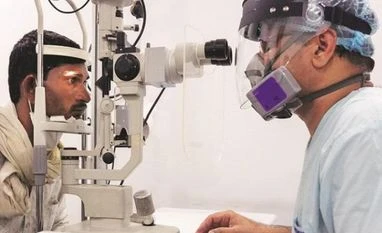The rise in the cases of the epidemic mucormycosis, which comes at a time when the country is battling the second wave of the Covid-19 pandemic, has state governments scrambling as they try to source medicines and develop adequate treatment protocols.
Maharashtra, which has 2,200 patients, is arranging for 60,000 additional vials of Amphotericin-B, a drug used to treat the disease, from June 1. This is over and above allocations made by the Centre.
Says Rommel Tickoo, director, internal medicine, Max Healthcare: “Almost always the patient is diabetic. And most are Covid patients who have been on higher steroid doses or have had longer ICU stay. Probably this strain is making them more susceptible.”
State task forces are working to detect the causes of this disease and design protocols for treatment.
Sashank Joshi, senior endocrinologist and member of Maharashtra’s Covid task force, said: “Diabetes, indiscriminate use of steroids, misuse of antibiotics, overuse of zinc and iron, and issues related to oxygen use (sterilisation of the distilled water in humidifiers etc)… We are investigating these matters.” Joshi also feels the variant of concern in the current Covid wave may be causing destruction of the nasal mucosa and playing a role in aggravating mucormycosis.
Hospitals, too, are getting battle-ready to fight the epidemic. Max Healthcare and a few others in Delhi have created special wards. “The disease is non-communicable but these patients have low immunity and have to be protected from getting any other infection,” Dr Tickoo said.
Symptoms and management
The spores of mucormycetes are in the air and a person’s immunity usually protects them against it. Post Covid, a combination of factors like high blood glucose, impaired immunity, indiscriminate use of steroids, are creating a conducive environment for this infection to grow in some patients. Doc
tors say 88 per cent of patients are diabetic.
Severe headache, loosening of upper teeth, swelling under the eyes, blurring of vision, restriction of eye movement, coloured (brown) discharge from the nose etc are symptoms of the disease. Joshi cautioned that every Covid patient needs to be careful post recovery. “Post Covid, vigilance is necessary for three weeks to three months, especially oral hygiene. One has to monitor blood glucose levels, and also be in touch with the lung doctor to ensure one is on the right dose of steroids and that it is tapered off quickly,” Joshi said.
One of the challenges in managing the disease is that it requires a multidisciplinary approach, which small nursing homes may find difficult to follow. Rahul Pandit, director – Critical Care, Fortis Hospital, Mulund, Mumbai and member of Maharashtra’s Covid taskforce, said: “Surgeries require multi-disciplinary teams, including dental surgeons, maxillofacial surgeons, ENT surgeons.”
Doctors say if patients avail of treatment in the early stages of the disease then endoscopic removal of the dead tissue in the nasal and sinus cavities may be sufficient, but the surgery becomes complex in late stages.
M Babu Manohar, senior consultant, ENT, head and neck surgeon, Apollo Hospitals, Chennai, said: “If it spreads to the eyes and damages them, then, removing the dead tissue may involve removing the eye-ball.”
Hospitals like Apollo have stepped up efforts to procure Amphotericin-B. Dr Manohar said they have procured conventional Amphotericin, and are trying to procure Liposomal Amphotericin (which is relatively less toxic to the kidneys).
The Centre has also been looking to increase the supply of Amphotericin-B. Union Health Minister Harsh Vardhan said recently that it was importing 900,000 vials. “Of this, 50,000 vials have been received and around 300,000 vials will be available in the next 7 days,” he had said.
Meanwhile, Ganga Ram Hospital has seen rare cases of mucormycosis of small intestine in two patients recently. “Ulceration of Jejunum (first part of small intestine) in the patient raised my suspicion of fungal disease and the patient was immediately started on antifungal treatment. We sent the portion of removed intestine for biopsy, which confirmed mucormycosis,” said Ushast Dhir, senior consultant in the department of surgical gastroenterology and liver transplantation, Sir Ganga Ram Hospital. Intestinal or GI mucormycosis is a very rare disease and most commonly involves stomach or large intestine.
Unlock 30+ premium stories daily hand-picked by our editors, across devices on browser and app.
Pick your 5 favourite companies, get a daily email with all news updates on them.
Full access to our intuitive epaper - clip, save, share articles from any device; newspaper archives from 2006.
Preferential invites to Business Standard events.
Curated newsletters on markets, personal finance, policy & politics, start-ups, technology, and more.
)